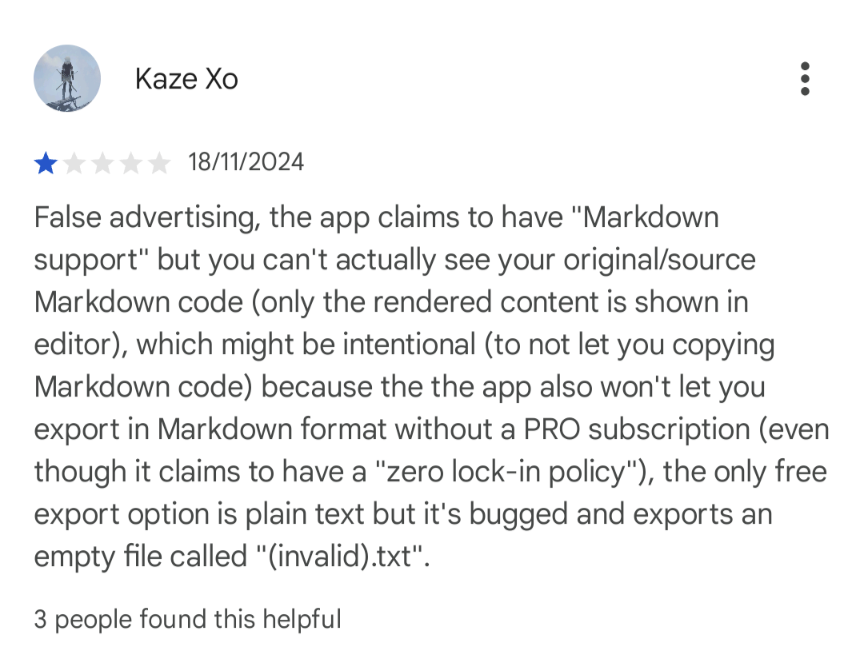- cross-posted to:
- [email protected]
- cross-posted to:
- [email protected]
It’s always been free for me using Mobius Sync…
Not the point here. Using it in a commercial environment for free was a violation of the terms, now it’s not anymore.
Ah got it, thanks for the clarification.
Now that it’s free, are its users the product?
Nothing else is changing. No account required, no ads, no tracking, no strings attached. Your data remains fully in your control, stored locally in plain text Markdown files. All features are available to you for free without limits.
“…until we have a large enough userbase to start monetizing and enshittifying…”
They have a plenty large enough user base and have not done so. You’re literally commenting this on a post of them doing the exact opposite. The fear mongering is insane.
It was nothing personal, more of an off-handed commentary on how things usually end up going after 20 years of seeing literally every site/service I’ve used and most of the companies I once considered “the good ones” eventually get shittier in some way when the business side puts on the squeeze.
The one exception I can think of is Wikipedia.
But I don’t have any reason to think badly of these folks, their current owners seem to have their hearts in the right place and indeed have made decisions that avoid lockin and assure users, and I hope they are another Wikipedia that will endure the tides of enshittification.
But I will never again assume that such hopes will remain the reality, even in this case. This is a snapshot in time. Owners change, priorities change, pricing models change, file formats change, common sense statements of basic decency like “don’t be evil” get rescinded, scrappy fun websites created by free-thinkers become tools of fascist oppression.
That doesn’t mean they don’t deserve your business and support currently. Just make sure your off-ramp options remain acceptable if things begin to change.
It’s interesting that a closed-source app has good reputation among FOSS enthusiasts. Surely they are not a Microsoft or Apple, but still who controls your computer, you or them?
It stores your data in plaintext, and simply uses the program to parse special formatting characters. There are no attempts at obfuscation or encryption, and it doesn’t lock you into a walled garden that refuses to play nice with other programs. The program itself is closed-source, but anyone could write an open source version to parse the same info… There just hasn’t been a good reason to do so. Even if Obsidian as a company and program ceases to exist overnight, your data is still safe on your machine and can be read by anyone who cares enough to dig into the file. Hell, you can even open it as the plaintext file and dig through it manually.
Hol up. Are notes stored in files in a directory structure or a single file? Just that you said “the file” so I’m wondering.
If so, that’s lock in.
It’s a directory. When you create a new note, it creates a new file inside of that directory. My point was simply that you can always just browse the directory and read the plaintext file for whichever note you want. Obsidian simply adds things like text formatting and automatic links to other notes.
This post was how I learned about Obsidian.
For those of you that love it, how do you use it daily?
Daily notes. I have a template that prompts me to fill out a number details I might otherwise forget.
A wiki of people that helps me remember details about people I meet or have worked with. Makes it much easier to keep in touch and to remember important dates in their lives.
Sortable todo lists, with due date and urgency information. I can add to the lists directly from any other note using a Dataview formula with the Tasks extension.
Career plans. Project plans. Gardening plans. Recipes (there’s an awesome extension that imports recipes from the web).
Any random writing I might want to do, from short stories to rough drafts of letters to stream of consciousness mind spew that I want to review later.
I use the Auto Note Mover and Dataview extensions, along with backlinks and tags, to keep all of my notes organized automatically. I use the Linter extension to make sure things are formatted nicely. When I started using Obsidian, I used the Importer extension to easily pull in all of my existing notes and lists from Evernote and Google Keep.
Honestly, that barely scratches the surface.
I don’t necessarily like a few takes in the comments here.
Vibes wise the Obsidian team seems to be great and they don’t seem to have shown any reason why I should distrust them. I love FOSS but gifting others my work doesn’t put food on my table, so in that sense they need to have a lucrative business model which they seem to have established.
I could use SyncThing, Git or other solutions to do synchronisation between my devices but I choose to buy their Sync offer, since I want to support them (they also have EU servers, which need to be GDPR compliant by law afaik).
The closest comparison I could make is NextCloud. NextCloud open sources their software, but they sell convenience. Sure, you could self host it, but paying them to do so for you may be more attractive. In comparison Obsidian is not really complicated to set up or maintain. It’s literally just a MD-editor. So the only convenient thing to sell is synchronisation if you don’t want to put a price tag on the software.
If they open source all their code, some tech wizard will implement a self hosted obsidian sync server with the same convenience as theirs in a day, and the company will lose their revenue stream.
We’ve all been burned by tech bros in one way or another, but I think it’s ok for people to profit off of their IP. And they seem to be doing so with a positive vision. Feel free to let me eat my words if they ever go rogue, but that’s my 2 cents.
Thanks for the rare, rational comment regarding Obsidian. Many people here seem to think releasing software as closed source automatically means you have something to hide; seemingly forgetting we live in a capitalist system in which you must constantly sell your services to survive. (I am saying this as someone who adores FOSS and donates to most of my homelab software on a regular basis).
I think a more productive way to look at is: is the closed source dev friendly (or at least non-hostile) to the open source community? In the case of Obsidian, they haven’t done anything egregious, and regularly contribute to open source plugins. Furthermore, the notes are stored as markdown files. This gives the user strong resistance against potential enshittification, so even if they did go rogue you can just move to some other text editor lol. Granted, you would miss out on plugins but otherwise that’s a good reason to keep your plugin usage light and plan your Obsidian vault accordingly.
If they open source all their code, some tech wizard will implement a self hosted obsidian sync server with the same convenience as theirs in a day, and the company will lose their revenue stream
Obsidian is storing everything as plaintext files. Those convenient selfhosted sync solutions have been out there for years.
It’s not just about syncing files. It’s also the fact I can edit stuff on my tablet and see the changes in almost real time on my laptop with Obsidian Sync. I believe most other solutions wouldn’t play nice with such a workflow.
With the vault stored on a synchronized cloud drive, Proton/Google/etc the same thing happens.
it’s ok for people to profit off of their IP
Absolutely. I just have trust issues with closed source software and platforms. Burned too many times.
I couldn’t get work to pay for it so I found a better, cheaper alternative, Notesnook. It’s open source (client and sync server), you can publish notes, and it’s end-to-end encrypted.
I just wanted to toss out another thanks for mentioning Notesnook. After a week I’m completely won over.
It says it’s free, but then there’s a pricing and plans page?

A lot of alarm bells ringing for me about that app.
Notesnook is free. It is developed under gpl https://github.com/streetwriters/notesnook








